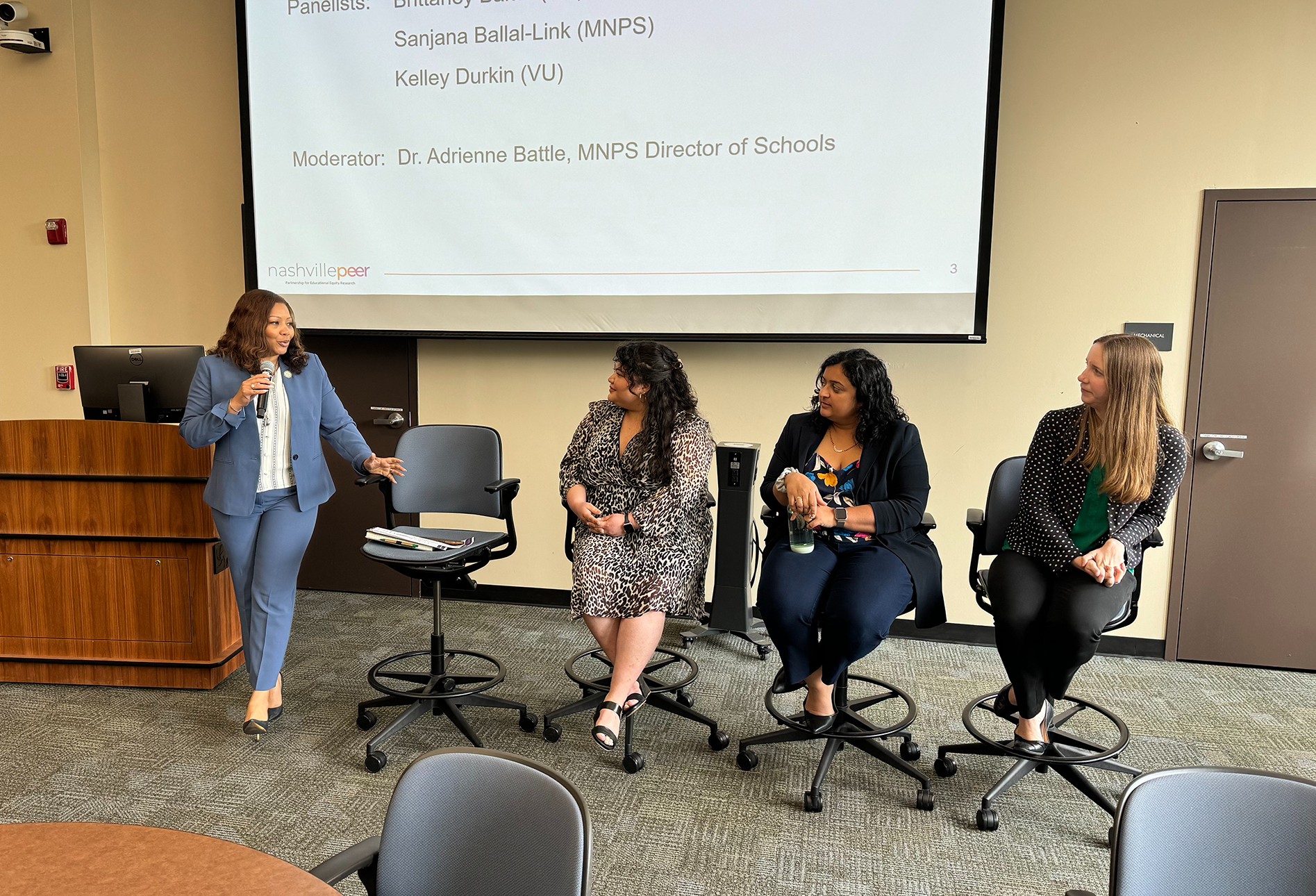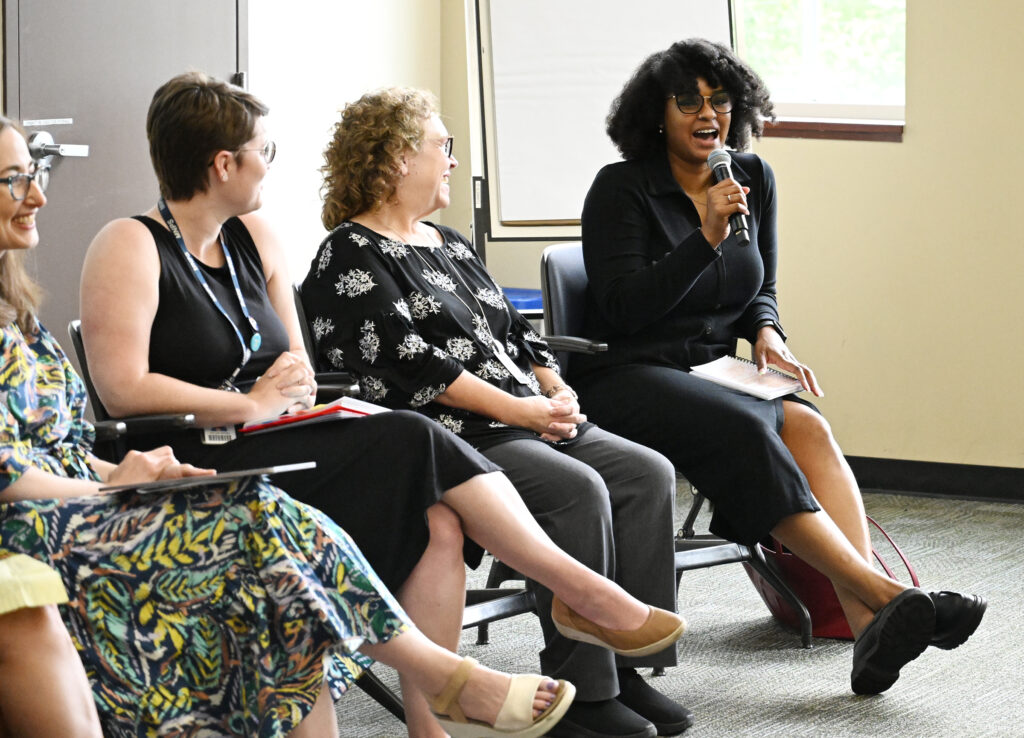Engage With Us
We want you to learn more about what we do and why we do it. We invite you to sign up to receive updates to learn how you can help us champion equity.

In May, PEER hosted its inaugural research symposium at the MNPS Martin Center for Professional Development. More than 70 leaders, including Vanderbilt faculty, MNPS staff, and MNPS board members, came together to learn about the research happening across PEER’s Working Groups and rapid response studies through study-specific poster displays and a series of panel discussions.
The panel discussions especially illuminated key insights about engaging in partnership research, including details about the research processes and practices and lessons learned from PEER collaborations with many different leaders across MNPS, Vanderbilt, and the larger Nashville community.
“As many attendees pointed out afterwards, the diverse voices and perspectives who contribute to PEER’s research are what makes this particular partnership special and impactful,” said Abbey Loehr, PEER co-director and manager of research practice partnerships at MNPS.
Some of the key insights gleaned from the panels include:
Stephanie Wyka, director of professional learning and growth for MNPS and one of the participants on PEER’s closing panel about centering equity in the research, stated that we must “ensure equity is not an afterthought, but that equity is THE thought.” PEER is working to do just that in the research it pursues, how the research is designed, and the processes and practices it puts in place to pursue its agenda.

The symposium provided opportunities for MNPS school board members, Vanderbilt University researchers, and MNPS leadership to engage and learn from one another, and PEER is eager to build on this momentum in the upcoming school year.
“We are especially grateful to the many practitioners from MNPS and faculty from Vanderbilt who serve on our steering committee and who regularly collaborate in our working groups and on the rapid response studies,” said Erin Henrick, PEER co-director and Vanderbilt faculty member. “Going forward, PEER will continue to build on the insights gleaned from the symposium and look to create more opportunities for cross-working group learning and relationship-building between research partners and leaders within MNPS.”
Leveraging the Educational Equity Ecosystem seeks to leverage collaborations with city and state agencies as well as other community stakeholders to foster citywide accountability for the wellbeing and success of Nashville children. They plan to identify key levers—including prenatal-to-3 supports, afterschool programs, and housing stability—through which they can better understand how inequity operates and how to develop joint accountability between MNPS and city and state agencies.
Working Group Members:
Strengthening Pathways to Postsecondary Readiness shared findings on why Early Postsecondary Opportunities (EPSOs) matter. EPSOs are courses that expose high school students to college coursework and foundational career skills and typically offer college credit. Students who completed an EPSO were more likely to score a 21 or higher on the ACT and enroll in a 4-year college. This working group also shared progress from co-design teams seeking to improve access, participation, and success in EPSOs at Antioch, James Lawson, and Stratford STEM Magnet high schools. They plan to implement strategies next year to increase student and family understanding of EPSOs, target outreach to students underrepresented in EPSOs, and develop a high school road map with an EPSOs tracker.
Working Group Members:
Understanding and Reducing Student Absenteeism seeks to understand the factors in students’ lives that affect their school attendance and the actions schools can take to promote student attendance. The working group has identified five MNPS schools where attendance rates for marginalized students have improved, but there are still high rates of chronic absenteeism. The team will conduct interviews and focus groups with students, caregivers, and school staff to learn more about the factors that contribute to attendance and absenteeism.
Working Group Members:
Supporting Educators to Provide High-Quality Instruction examines the use of monthly classroom walkthroughs from school leaders and specialists as well as monthly school staff reflection meetings at four of MNPS’ largest high schools to support the district’s vision for high-quality math instruction and application of new curriculum. Early implementation of the walkthroughs and meetings have occurred routinely and engaged school personnel with diverse expertise. The research team plans to identify ways to improve walkthroughs and scale the routine.
Working Group Members:
MNPS Navigators Rapid Response Study seeks to connect every MNPS student to an adult mentor, or “navigator.” The study found success in the Navigator Program’s ability to build strong relationships between adults and students but also the need to streamline processes and clarify the program’s purpose. The district used these findings to combine online weekly and monthly adult-student check-ins into one platform, design metrics to monitor progress, improve meetings between the district and platform teams to gather implementation data by school, and improve messaging on the program’s purpose.
Study Team Members:
Understanding How MNPS’ Five-Tiered Intervention Platforms are Working to Improve Students’ Literacy and Numeracy analyzed the effects of literacy and math interventions on the growth of elementary school students’ skills and knowledge. Interventions related to positive trends in knowledge growth, with the largest gains in the early grades. The research team plans to further investigate how schools with the highest growth rates implement interventions.
Study Team Members:
Navigating the “Summer Melt” Across the University MNPS Program examined the factors that cause “summer melt,” the phenomenon of high school graduates failing to matriculate to college in the fall despite having been accepted and made deposits to a college or university. The study found that social barriers – such as family obligations and absence of college role models – financial barriers, and lack of familial college experience (e.g., a first-generation student) contribute to “summer melt.” The team recommends schools clarify communication during the transition from high school to college, establish stronger bridge programming to help students prepare, work with institutions to move up the application and acceptance timeline, and collect data via student surveys to track “summer melt” status.
Study Team Members:
Panel 1: What We’re Learning About Creating Shared Research Plans
PEER working group members discussed how their teams create and share actionable research plans relevant to the needs of MNPS and other districts and contribute to understandings in research literature. The panelists emphasized the importance of stakeholder engagement, literature reviews, and balancing practical needs with research contributions.
Panel 2: All About Rapid Response Projects
The panelists discussed the importance of amplifying student voices, developing specific research questions, and building close partnerships between Vanderbilt and MNPS colleagues to ensure projects deliver concrete and actionable recommendations.
Panel 3: What we’re Learning about Equity-Centered Research
PEER working group members discussed how equity informs partnership practices, their attention to power dynamics between researchers and practitioners, and the design and implementation of research plans to ensure that designs are equitable. They also highlighted the importance of listening to students, families, and community members when making decisions about policies, programs, and initiatives.
We want you to learn more about what we do and why we do it. We invite you to sign up to receive updates to learn how you can help us champion equity.